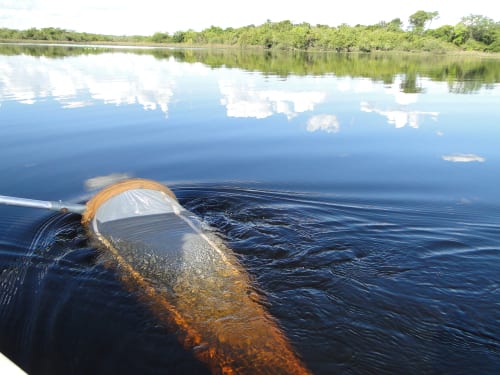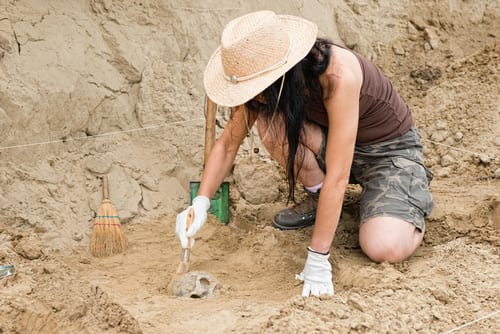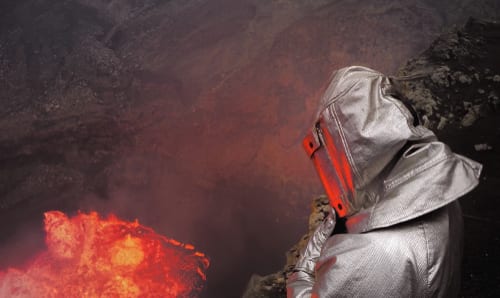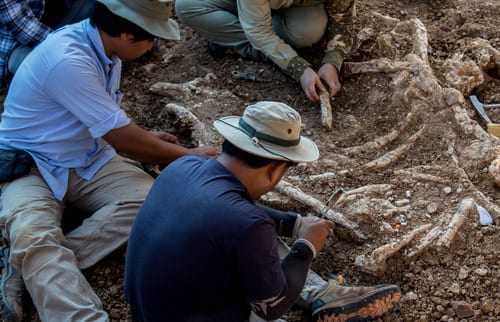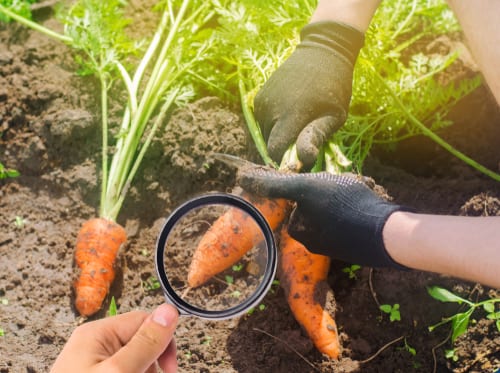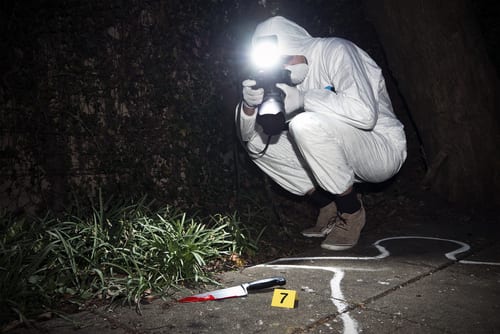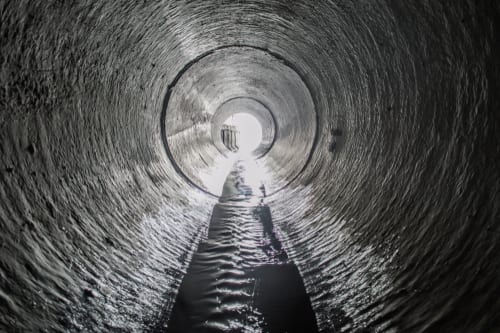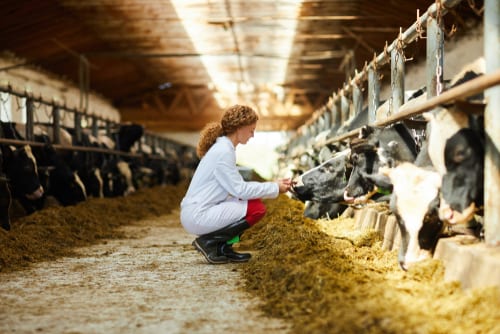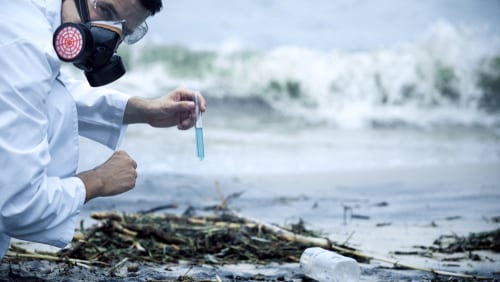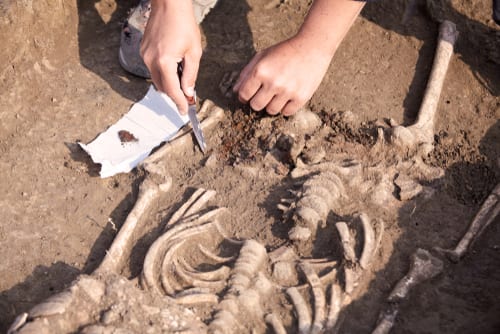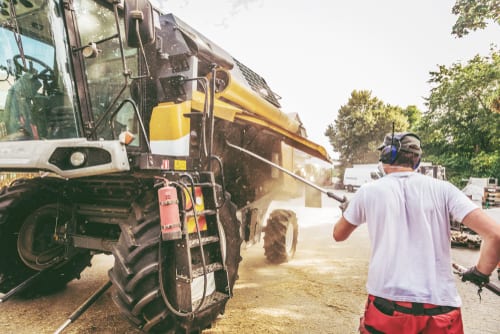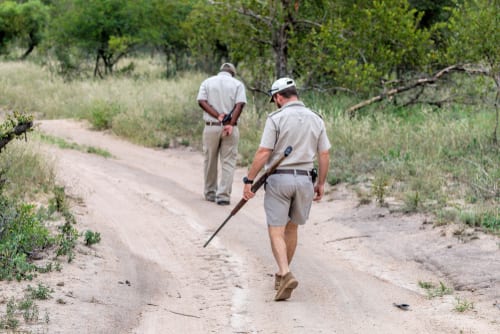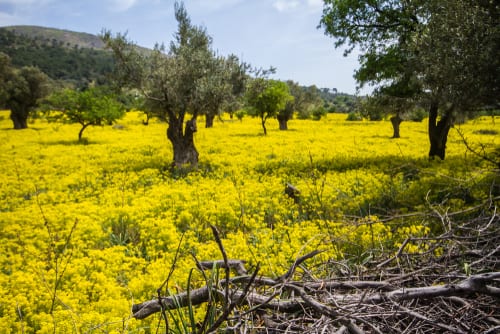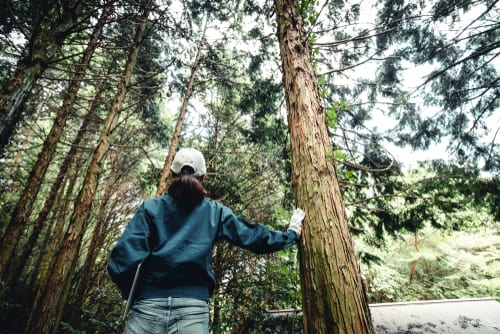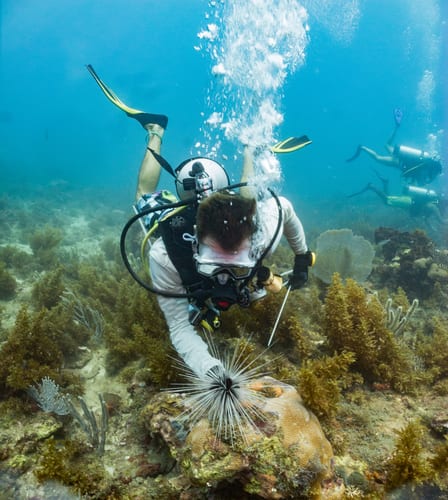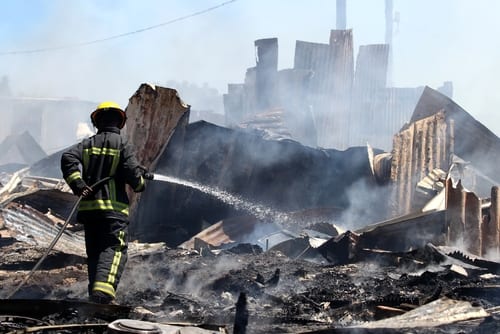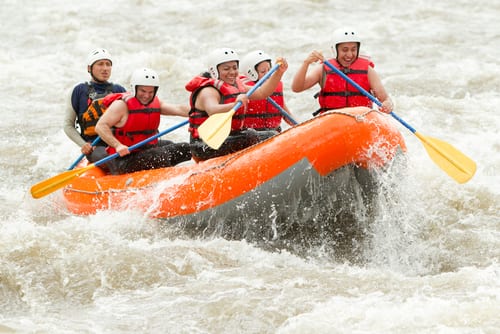A lot of degree programs involve hours spent in lecture halls, days spent scribbling away in the library and perhaps many a sleepless night in the computer lab working on assignments. However, if prospective university students like the feeling of fresh air on their faces and mud on their palms, there are in fact a fair few courses that take a much more hands-on approach to study.
The following list is full of programs that throw their learners out into the field, where they can really engage with their subject and have some fun getting their hands dirty. From encounters with animals to extreme sports adventures, there’s something to interest anyone with a taste for the outdoors or a desire for a different kind of challenge.
You may also enjoy our list of 30 lucrative TRADE SCHOOL degree programs and jobs!
To source entries for this piece, we initially looked at list articles covering degrees for adventurous and outdoorsy people, as there were no existing lists dealing specifically with “dirty degrees.” For further inspiration, we consulted other lists of what has been deemed unusual college degrees – some of which include elements with the potential to “get you dirty” – and also considered which programs would most fit the selection criteria outlined below. Further options were found simply through our own independent searches.
For a degree subject to be selected, it had to be offered as a program at least one U.S. college or university and to incorporate practical work that has the likelihood of getting students dirty or, in some cases, soaked. Moreover, we consulted descriptions of specific degree courses at the schools named in each entry and elsewhere – in particular, through information provided on the institutions’ official websites – to confirm this.
A second stipulation was that the career prospects associated with the degrees needed to have the potential to lead down an outdoorsy or otherwise hands-on and “dirty” route. There was also the possibility of overlap between the course content of two subjects in related fields – for example, environmental toxicology and land rehabilitation. Hence, similar programs were only included if there was a distinct difference in the types of “dirty” activities undertaken during their study.
And, away we go! get ready to get dirty!
30. Metalsmithing
Northern Michigan University’s School of Art and Design offers a bachelor of fine arts in which undergraduates major in jewelry, metalsmithing, and blacksmithing. The four-year program at the Marquette, Michigan-based university gives students the chance to acquire a wide range of proficiencies, including welding, casting and metal production. Learners also work with fire and a variety of tools in the school’s jewelry, metalsmithing, and blacksmithing studio as they create works of art or practical tools from the glowing metal. Given the focus on allowing students to discover their own often labor-intensive concentrations within the core curriculum, graduates should leave with the necessary knowledge to follow their chosen career path – be it blacksmithing or becoming an artist.
29. Equine Studies
Whether you’re talking breeding, riding, racing or otherwise competing, horses can represent varied career paths for anyone who enjoys working with large animals. But be warned: it may get a little messy. While a horse might look neat and clean when trotting out during dressage, degree programs in equine studies will soon have students experiencing first hand what goes on behind the scenes. For example, Becker College in Worcester, Massachusetts expects students majoring in equine studies to work in its well-equipped 40-acre Equestrian Center in Paxton. Learners care for the horses as part of their course credit, and this involves grooming, feeding and, of course, mucking out the stables. Still, after paying their dues, an equine studies graduate will be on their way towards jobs working with the more than nine million steeds in the nation.
28. Viticulture and Enology
The University of California, Davis’ viticulture and enology program offer a graduate and an undergraduate degree scheme in the art of producing grapes and making wine. Topics covered include fermentation, an account of grape growing, food science, farming, and ecological chemistry, and issues affecting the taste of wine. Meanwhile, students will benefit from California’s rich winemaking history, extensive vineyards, and excellent wine-producing weather conditions. The university gives learners hands-on experience through various field trips, while viticultural internships are bound to get students’ hands dirty, with some putting interns to work with crops and tractors. Graduates can look forward to potentially lucrative careers in areas varying from winemaking to vineyard management.
27. Petroleum Engineering
In a recent survey, the National Association of Colleges and Employers stated that graduates with a bachelor’s degree in petroleum engineering are paid an average annual starting salary of $95,300 – over $28,000 more than any other graduate-level engineering job. Students taking petroleum engineering at the University of Kansas’ School of Engineering in Lawrence, Kansas or the Colorado School of Mines: Petroleum Engineering degree program in Golden, Colorado may wish to take note of this when they attend excursions to working oil and gas fields – in the latter case, to the biggest oilfield in the Rocky Mountains. It is here that learners will encounter the dirty real-world aspects of the job – from drilling to production – that will become an essential part of their careers as exploration directors, drilling systems engineers or refinery managers.
26. Environmental Chemistry
An undergraduate degree in environmental chemistry is available from the State University of New York College of Environment Science and Forestry (SUNY-ESF), while a Ph.D. in the same can be earned from the University of Alaska, Fairbanks. The programs focus on the chemical properties of air and water in our environment, which may see students researching in a laboratory – or out in the field. Current messy-sounding research being conducted at SUNY-ESF includes studies of coral reef surroundings, gunshot residues and “smog chemistry.” Graduates from these programs can progress toward careers working as researchers and consultants for a variety of corporations, or even in the area of forensics.
25. Construction Engineering
There is plenty of grime on a dusty building site to get a construction engineer or construction manager dirty while helping to build the roads, bridges, and homes that are so vital to society. Furthermore, students on Purdue University’s construction engineering course in West Lafayette, Indiana or Columbia University’s construction engineering and management program in New York City can expect to find themselves on internships right there alongside such professionals in the field. In fact, by the time they graduate, learners at Purdue will have completed nearly nine months of work experience, leaving them in no doubt about what they’ll be getting into in their future careers.
24. Geography
On a career path to becoming a cartographer, an environmental engineer or a landscape architect, geography students must do far more than just look at things on a map: they’re quite likely to have to get out there and experience all of nature’s overgrown, wet and wild glory. One good reason to choose a geography degree course carefully is that fieldwork is liable to be conducted in the university’s surrounding area. Of course, more adventurous, outdoorsy students will thrive on a bachelor’s, master’s or doctorate program in geography at the University of Hawai’i at Mānoa, which benefits from the incredible surroundings of the Aloha State’s lush plant life, craggy mountains, volcanic features, and differing wet and dry seasons.
23. Explosives Engineering
Explosives technicians – who spend their days blowing up buildings and creating clouds of filthy debris – need training in order to carry out their duties safely. It’s therefore good to know that a doctor of science in explosives technology from the University of Missouri System located in Columbia, Kansas City, Rolla and St. Louis provides just such a foundation. The school teaches students the math and science behind calculating a required explosion as well as the rules and policies to follow. The school boasts itself as the only explosives engineering master of science degree program in the nation. Future roles in fields such as quarrying, mining, and regulation include becoming a construction blasting technician, blasting inspector or consultant, or seismograph technician.
22. Plant Biology
The University of California, Davis runs courses in plant biology up to the Ph.D. level for any bright and green-fingered prospective students. Focuses include biochemistry, genetics and physiology, and there is plenty of hands-on lab work as well as a chance to study the area surrounding the university’s Bodega Marine Laboratory. This dedicated facility sits on coastal land that is rich with a variety of plant and animal specimens, and as many as 1,000 undergraduate students a year research the protected habitat in the field. Future career opportunities here are exciting and diverse, potentially taking graduates into areas such as plant reproduction, forestry, biotechnology or ecological defense.
21. Visual Journalism
A photojournalist could end up anywhere in the world – but good stories don’t always unfold in clean, well-lit buildings with tea and coffee facilities. These journalism professionals might be outdoors in all the city grime, mud or bombed-out rubble of any given news event. Students in the subject can attempt to get a good grounding in this potentially dirty aspect of the job. A bachelor’s degree in commercial photography with an emphasis in photojournalism from the Rocky Mountain College of Art + Design in Denver, Colorado requires students to complete a real-world internship. The school’s “learning by doing” teaching method has seen budding photojournalists snapping away while on a rainy golf course or waist deep in water.
20. Meteorology
The University of Oklahoma’s School of Meteorology in Norman offers bachelor’s, master’s and Ph.D.s in meteorology – and learners would be hard pushed to find a better spot for analyzing the atmosphere. Supervisory soil scientist Jean Steiner once described Oklahoma’s unpredictable annual weather as “very hot, very cold, very wet, very dry.” Inside the National Weather Center, students will be well placed to experience the real-world aspects of meteorological research and storm prediction. Plus, there’s the possibility of them getting their hands dirty in the middle of Oklahoma’s spring tornado season. Career opportunities extend from the air-conditioned world of TV weather presenting to lab-based government research and potentially wet and windy meteorological fieldwork.
19. Oceanography
Any students thinking that a B.Sc. in oceanography may sound a bit too clean for their liking will soon change their minds after a trip on a research boat. Humboldt State University in Arcata, California lets students on board the 90-foot R/V Coral Sea and teaches them to put trawls and plankton nets to use – while getting sprayed with salt water. Undergraduates master sonar and head to the vessel’s wet or dry labs to get their hands on aquatic creatures, notching up some 100 hours at sea over the course of their degree. With the help of a nicely kitted out facility in Trinidad, California, anyone graduating from this course will be well versed in modern oceanographic techniques and prepared for a future career in research or with environmental organizations.
18. Mining Engineering
Mining jobs can be well paid – but they can also get pretty filthy, as those graduating with a bachelor’s or a master’s in mining engineering from the University of Nevada, Reno should know. With training in everything from designing and organizing mines to ultimately shutting them down, students will experience getting out into the dirt-caked conditions of real working mines on field trips – seeing first hand the premises they’ve been learning about in class. Mining engineers are generally concerned in all phases of a given development, so working above and below ground comes with the territory. Additional career possibilities range from technical writer to refinery manager.
17. Anthropology
Anthropology involves the advancement of knowledge about human beings, but it is also a discipline that can take students into some surprisingly messy areas. Whether aiming for a career in forensics, ethnography or archaeology – among other possibilities – learners often need to get out of the classroom and into the outdoors through field trips and internships. Appalachian State University in Boone, North Carolina offers a B.A. and a B.S. in anthropology as well as running a summer field school in Ecuador that can be attended by students from across the nation. Here, learners have ample chance to get their hands dirty while spending some time hiking through the Amazon jungle. Attendees can also partake in an induction involving harvesting cassava as they work among the indigenous population of the banks of the Napo River.
16. Geology
The roles a geology graduate can take on may include a plethora of different fields, from paleontology to hydrology and volcanology. What’s more, California State University, Long Beach’s department of geology offers options and programs – such as a B.S. or an M.S. in geology – that have seen students thrilled to get not just their hands dirty, but their whole bodies. A field trip to the Pisgah volcano in the Mojave Desert witnessed geology learners hike to a cinder cone and through grimy lava tubes. Elsewhere, the University of Minnesota‘s BS in Earth Science in Minneapolis sends advanced field geology students to landscapes such as Black Hills in South Dakota and Nevada’s Snake Range to experience incredible rock formations first hand.
15. Paleontology
There is an abundance of knowledge to be gleaned from fossils, but digging them up can be dirty work. Mesalands Community College in Tucumcari, New Mexico – close to the exceptional Quay County region fossil bed – runs an associate degree course in natural sciences with an option in paleontology. The program includes field trips on which students could get pretty filthy brushing detritus away to expose the fossils of organisms from Earth’s history. These expeditions have to date excavated three formerly undiscovered species. A comprehensive graduate program is also available from the University of Michigan’s Museum of Paleontology in Ann Arbor. As well as offering the opportunity to travel to dig sites across the globe, a degree in paleontology may lead to careers in areas such as education, geological mapping and oil hunting.
14. Sustainable Agriculture and Food Systems
Career paths to be pursued following a sustainable agriculture and food systems degree are varied and could involve farming, the food industry or scientific research. Yet regardless of whichever path most appeals, students will need to have a firsthand knowledge of agriculture, and that most likely means them getting their hands in some soil. The University of California, Davis offers students a major in sustainable agriculture and food systems, which encourages hands-on contact with food production and relevant government organizations. Alternatively, a perhaps even more dirt-focused degree called crop and soil science can be taken at Oregon State University in Corvallis. Essential work experiences here will enable students to get out in the field and apply their new-found knowledge to real-world situations.
13. Forensic Science
Gloved hands are definitely going to get dirty when students train in applied forensic science for careers in toxicology, investigations and pathology. Indeed, in the real world, crime scene investigators have to deal with blood, drugs and firearm residue on a routine basis, and such elements need to be collected from the field before being returned to a clean laboratory. Point Park University in Pittsburgh allows its forensic science majors to use its unique crime scene house to examine criminal situations. It also offers internships and field trips to parks so that students can practice scouring for proof of crimes. Of course, crime scene investigation isn’t the only type of forensic science, and related disciplines such as forensic anthropology afford further opportunities to get dirty.
12. Civil and Environmental Engineering
Environmental engineers work for government bodies, surveyors and architecture firms to ensure that certain areas are kept clean and on-regulation through measures such as water treatment systems, recycling and waste management. Still, it can sometimes be a dirty job that may involve squatting in grimy drainage systems while taking readings or scooping up soil samples for analysis. Bachelor’s and master’s students enrolled in Bucknell University’s civil and environmental engineering program in Lewisburg, Pennsylvania also get the chance to experience work in the field as they prepare to face these future challenges. Sending students out on trips to construction sites in Washington D.C. and Baltimore is one aspect of Bucknell’s programs, which in addition allow learners to get hands-on with a full-size drilling rig.
11. Animal Science
An animal science degree may focus on the health and behavior of farm animals, the process of producing food, the running of livestock breeding programs, and domestic animals such as cats and dogs. Potential future careers include becoming a veterinarian, researching health problems in pigs and working towards improving the quality of dairy products. Animal Science courses are offered by the University of Connecticut in Storrs and Montana State University in Bozeman, which runs a master’s and a doctoral program in animal and range sciences. The composition of each course varies depending on specialty, but one constant seems to be hands-on work with groups of very messy animals. Expect to encounter mud, milk and, most likely, manure.
10. Environmental Studies
Warren Wilson College in Asheville, North Carolina offers B.A. or B.S. degrees in environmental studies that cover a wide range of subjects dealing with ecological concerns. The school advises students to take internships so as to apply their learning in the field, with the aim of producing graduates who are aware of the impact of human actions. And here’s where it gets messy. With options such as aquatic ecology and water pollution together with soil science, there should be ample potential for muddiness and getting wet on the way to becoming a nature conservation officer, toxicologist or even a landscape architect.
9. Archaeology
For those who like nothing better than spending their time among the dirt, a degree in archaeology should provide plenty of relevant opportunities. Massachusetts’ Boston University hosts a unique archaeology department that offers undergraduate and graduate programs in archaeology, taught by faculty currently conducting research. Students will assist with excavating sites in countries as diverse as Guatemala, Ethiopia and France. In the process, they will help to unearth clues about our history while sifting through piles of dust and dirt, quite possibly down holes and on their hands and knees. Upon completion of their programs, learners will be well prepared for potential futures as archaeological field technicians or supervisors.
8. Agricultural Equipment Technology
Farming is dirty work, and the machinery used is liable to get even dirtier. Tractors, combine harvesters and manure spreaders can all break down, and when they do, somebody needs to roll up their sleeves and get their hands dirty fixing them. Through its College of Applied Technologies, the University of Northwestern Ohio in Lima, Ohio offers an associate degree in agricultural equipment technology and an agricultural equipment technician diploma. By means of these courses, students can acquire proficiencies in areas such as welding, electronics, hydraulics and engine repair. Programs put learners’ training and knowledge into practice by focusing largely on applicable automotive competencies. Students will gain a useful set of skills that could see them enter the world of farming or mechanics.
7. Wildlife Conservation
The University of Maine in Orono, Maine offers a master of wildlife conservation degree for graduates and a program in wildlife ecology for undergrads. Both courses are concerned with animals and their natural habitats, many of which are in areas within the state. Moreover, either option could lead to a number of field-based jobs, including wildlife biologist, conservation manager or park ranger. The content of the bachelor’s program, in particular, is outdoorsy and exciting: students may go out in the field to assess the behavior of snowshoe hares, or even handle bear cubs in their own den. Graduate students, meanwhile, can choose to conduct surveys of a protected area. All this provides plenty of opportunity for getting back to nature – and possibly covered in fur.
6. Land Rehabilitation
Available from Montana State University in Bozeman is the multifaceted M.S. degree in land rehabilitation. In developing students’ understanding of the ways in which earth, plant life, and water work together, the idea is for them to get to grips with how to help restore environments affected by human and other activity. As well as taking on board knowledge to underpin their learning, students are sent out into the field to get dirty, collecting samples and deciding which remediation methods might be most appropriate. With the skills learned from this course, graduates can look forward to successful careers as environmental consultants or educators or perhaps even working in the engineering industry.
5. Forestry
Making a career out of spending time in some of the world’s most beautiful forests is certainly an appealing prospect – and it’s just one possible outcome of a B.S. in forestry from Northern Arizona University in Flagstaff. Make no mistake about it, though: this won’t be a walk in the park. Field studies are conducted in the nearby San Francisco Peaks – the loftiest mountain range in the state – and among the enormous number of ponderosa pines around the Colorado Plateau, which is just northeast of Flagstaff. Certificate courses also include wildlife and fire ecology. Here a number of career paths open up to graduates, among them professional forestry, private consultancy, and opportunities within the U.S. Fish and Wildlife Service.
4. Marine Biology
The baccalaureate degree in marine biology from the University of Oregon (UO) in Charleston or the M.S. in marine biology from Northeastern University in Boston, Massachusetts bring students into direct contact with all sorts of aquatic organisms. UO students may wade through a nearby mudflat for clams and worms, while their Northeastern counterparts can brave the seas on research boats big and small to collect samples and data from the ocean or close to the shore. Marine laboratories at both locations offer further scope for hands-on experience with diverse sea creatures. And if students are able to cope with the conditions, then upon graduating they can look forward to future employment positions such as coral reef biologist or fisheries observer.
3. Fire Science
The University of New Haven in West Haven, Connecticut offers a master’s and a bachelor’s degree in fire science, giving students a hands-on taste of their possible adrenaline-pumping careers. Given that fires cause needless deaths and material damage, new generations of firefighters must constantly take up the challenge. Understanding the behavior of a fire is key to learning how to manage it, so classes such as fire chemistry and physics with lab and the chemistry of hazardous materials are incredibly important for future firefighters and fire investigators. The university boasts excellent labs in which to experience mock investigations, and it insists on internships, with some students even encountering the heat, smoke, and dirt of fires as volunteer firefighters.
2. Outdoor Leadership
Teaching the next generation of expedition guides, kayaking instructors and ecotourism professionals, an outdoor leadership degree sends its students out into the backcountry to learn how to survive in all the dirt that nature can throw at them. Located in Georgia, Young Harris College has an outdoor leadership program that trains its students as Wilderness First Responders and dispatches them out into the surrounding Cherokee, Nantahala and Chattahoochee National Forests within a year. There they can test out their new skills in climbing, fishing, canoeing and all manner of survival techniques. Students will not only develop their outdoors proficiencies, but also leadership competencies they might use in many other future careers.
1. Adventure Education
The main aims of an adventure education degree are to equip students with in-depth environmental knowledge and encourage personal development while also teaching outdoor and extreme sports-related proficiencies. Students could be sent climbing rock faces, white water rafting, skiing down mountains or diving underwater, to name but a few potential activities. Adventure education programs are available from institutions such as Prescott College in Arizona. Prescott not only utilizes the stunning landscape of its own state for fieldwork, but also sends its students across the globe. The employment possibilities arising from an adventure education degree are exciting and varied, with jobs ranging from wilderness therapy leaders to snowboarding instructors to park rangers.













